Define late adolescence - Study guides, Class notes & Summaries
Looking for the best study guides, study notes and summaries about Define late adolescence? On this page you'll find 453 study documents about Define late adolescence.
All 453 results
Sort by
 Popular
Popular
-
Test Bank for Davis Advantage for Maternal-Child Nursing Care 3rd Edition by Scannell Ruggiero
- Exam (elaborations) • 859 pages • 2024
-
- $17.39
- 1x sold
- + learn more
Test Bank for Davis Advantage for Maternal-Child Nursing Care 3rd Edition by Scannell Ruggiero MULTIPLE CHOICE A patient chooses to have the certified nurse midwife (CNM) provide care during her pregnancy. What does the CNMs scope of practice include? • Practice independent from medical supervision • Comprehensive prenatal care • Attendance at all deliveries • Cesarean sections ANS:B The CNM provides comprehensive prenatal and postnatal care, attends uncomplicate...
 Popular
Popular
-
NSG526 / NSG 526 Exam 1 (2024 / 2025 Update): Clinical Modalities in Advanced Psychiatric Mental Health Nursing Practice | Questions with Verified Answers - Wilkes
- Exam (elaborations) • 44 pages • 2024 Popular
- Available in package deal
-
- $7.99
- 1x sold
- + learn more
NSG 526 / NSG526 Exam 1 | Questions with Verified Answers | 2024 / 2025 Update - Wilkes Q: Stages of Development? Answer: 1. Infancy (birth to 18 months) 2. Childhood (18 months to 6 yrs.) 3. Juvenile (6 to 9 yrs.) 4. Preadolescence (9-12 yrs.) 5. Early Adolescence (12-14 yrs.) 6. Late Adolescence (14-21 yrs.) Q: Characteristic of Infancy? Answer: Gratification of needs Q: Characteristic of Childhood? Answer: Delayed gratification Q: Characteristic of Juvenile? Answer: Formation of peer group Q:...
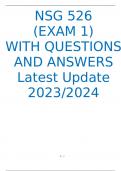
-
NSG 526 (EXAM 1) WITH QUESTIONS AND ANSWERS Latest Update 2023/2024
- Exam (elaborations) • 20 pages • 2023
-
Available in package deal
-
- $14.99
- 3x sold
- + learn more
NSG 526 EXAM 1 2023/2024 1. -An expectable or culturally approved response to a common stressor or loss, such as the death of a loved one -Socially deviant behavior (i.e. political, religious, or sexual) and conflicts that are primarily between the individual and society (unless the behaviors are due to a dysfunction): What is not considered a mental disorder? 2. -Associated with significant distress or disability in social, occupation, or other important activities -Significant disturbance ...
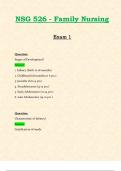
-
NSG526 / NSG 526 Exam 1 (Latest 2024 / 2025 Update): Family Nursing | Questions with Verified Answers | 100% Correct | Grade A - Herzing
- Exam (elaborations) • 45 pages • 2024
- Available in package deal
-
- $7.99
- + learn more
NSG 526 / NSG526 Exam 1 Family Nursing | Questions with Verified Answers | 2024 / 2025 Update Grade A - Herzing Q: Stages of Development? Answer: 1. Infancy (birth to 18 months) 2. Childhood (18 months to 6 yrs.) 3. Juvenile (6 to 9 yrs.) 4. Preadolescence (9-12 yrs.) 5. Early Adolescence (12-14 yrs.) 6. Late Adolescence (14-21 yrs.) Q: Characteristic of Infancy? Answer: Gratification of needs Q: Characteristic of Childhood? Answer: Delayed gratification Q: Characteristic of Juvenile? Answer: Fo...
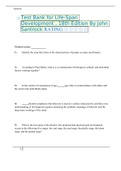
-
Test Bank for Life-Span Development , 18th Edition By John Santrock 172 Q&A RATING
- Exam (elaborations) • 62 pages • 2022
-
- $17.49
- 13x sold
- + learn more
o Test Bank for Life-Span Development , 18th Edition By John Santrock RATING Student name: 1) Identify the term that refers to the characteristics of people as males and females. 2) According to Paul Baltes, what is a co-construction of biological, cultural, and individual factors working together? 3) In the context of conceptions of age, age refers to connectedness with others and the social roles individuals adopt. 4) theorists emphasize that behavior is...
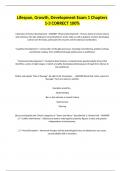
-
Lifespan, Growth, Development Exam 1 Chapters 1-3 CORRECT 100%
- Exam (elaborations) • 13 pages • 2024
-
Available in package deal
-
- $11.99
- + learn more
Domains of Human Development - ANSWER *Physical Development*: Process starts in human infancy and continues into late adolescent concentrating on motor skills as well as puberty. Involves developing control over the body, particularly the muscles and the physical coordination. *Cognitive Development*: Construction of thought processes, including remembering, problem solving, and decision making, from childhood through adolescence to adulthood. *Psychosocial Development*: Created by Erick E...
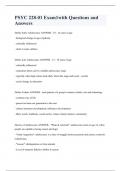
-
PSYC 228-01 Exam1with Questions and Answers
- Exam (elaborations) • 21 pages • 2024
-
Available in package deal
-
- $7.99
- + learn more
PSYC 228-01 Exam1with Questions and Answers Define Early Adolescence ANSWER - 10 - 14 years of age - biological change in age of puberty - culturally influenced - short in some cultures Define Late Adolescence ANSWER - 15 - 18 years of age - culturally influenced - sometimes there can be a middle adolescence stage - typically when high school ends that's when this stage ends (end = social) - social change in education Define Culture ANSWER - total pattern of a group's customs, ...
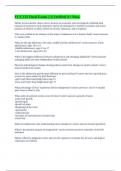
-
FCS 315 Final Exam || A Verified A+ Pass.
- Exam (elaborations) • 6 pages • 2024
-
- $10.69
- + learn more
Define socioeconomic status correct answers an economic and sociological combined total measure of a person's work experience and of an individual's or family's economic and social position in relation to others, based on income, education, and occupation Who was credited as the initiator of the study of adolescence as a distinct field? correct answers G. Stanley Hall What are the age differences for early, middle and late adolescence? correct answers -Early adolescence: ages 10 to 14 ...
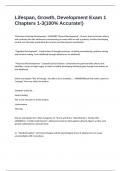
-
Lifespan, Growth, Development Exam 1 Chapters 1-3(100% Accurate!)
- Exam (elaborations) • 13 pages • 2024
-
- $15.99
- + learn more
3 Domains of Human Development - ANSWERS*Physical Development*: Process starts in human infancy and continues into late adolescent concentrating on motor skills as well as puberty. Involves developing control over the body, particularly the muscles and the physical coordination. *Cognitive Development*: Construction of thought processes, including remembering, problem solving, and decision making, from childhood through adolescence to adulthood. *Psychosocial Development*: Created by Erick...
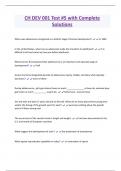
-
CH DEV 001 Test #5 with Complete Solutions
- Exam (elaborations) • 8 pages • 2024
- Available in package deal
-
- $12.99
- + learn more
CH DEV 001 Test #5 with Complete Solutions When was adolescence recognized as a distinct stage of human development? in 1904 In the United States, when has an adolescent made the transition to adulthood? it is difficult to tell and varies by how you define adulthood Which person first proposed that adolescence is an important and separate stage of development? Hall Across the three designated periods of adolescence (early, middle, and late), what typically decreases? none of these D...
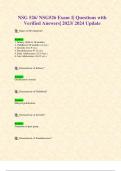
-
NSG 526/ NSG526 Exam 1| Questions with Verified Answers| 2023/ 2024 Update
- Exam (elaborations) • 31 pages • 2023
-
Available in package deal
-
- $10.99
- + learn more
NSG 526/ NSG526 Exam 1| Questions with Verified Answers| 2023/ 2024 Update Q: Stages of Development? Answer: 1. Infancy (birth to 18 months) 2. Childhood (18 months to 6 yrs.) 3. Juvenile (6 to 9 yrs.) 4. Preadolescence (9-12 yrs.) 5. Early Adolescence (12-14 yrs.) 6. Late Adolescence (14-21 yrs.) Q: Characteristic of Infancy? Answer: Gratification of needs Q: Characteristic of Childhood? Answer: Delayed gratification Q: Characteristic of Juvenile? ...

How did he do that? By selling his study resources on Stuvia. Try it yourself! Discover all about earning on Stuvia


